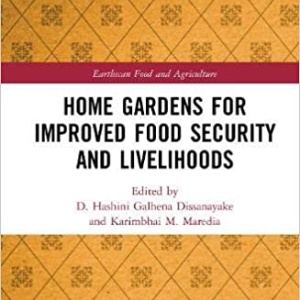
This book uses case studies from Africa, Asia and Latin America to argue that, in the right circumstances, home gardens can help to supply people with food and income. It explores how home gardening relates to gender, food security, resilience and poverty alleviation.
Publisher’s summary
Home Gardens for Improved Food Security and Livelihoods demonstrates how home gardens hold particular significance for resource-poor and marginalised communities in developing countries, and how they offer a versatile strategy toward building local and more resilient food systems.
With food and nutritional security being a major global challenge, there is an urgent need to find innovative ways to increase food production and diversify food sources while increasing income-generating opportunities for communities faced with hunger and poverty. This book shows that when implemented properly, home gardens can become just such an innovative solution, as well as an integral part of sustainable food security programmes. It provides a conceptual overview of social, economic, environmental and nutritional issues related to home gardening in diverse contexts, including gender issues and biodiversity conservation, and presents case studies from Africa, Asia and Latin America highlighting home gardening experiences and initiatives. The volume concludes with a synthesis of key lessons learned and ways forward for further enhancing home gardens for sustainable food security and development.
This book will be a useful read for students and scholars working on local food systems, food security, sustainable development and more broadly development strategy.
Reference
Dissanayake, D. H. G. and Maredia, K. M. (eds.) (2020). Home Gardens for Improved Food Security and Livelihoods, Routledge, London and New York.
Read more here. See also the Foodsource building block What is food security?







Post a new comment »